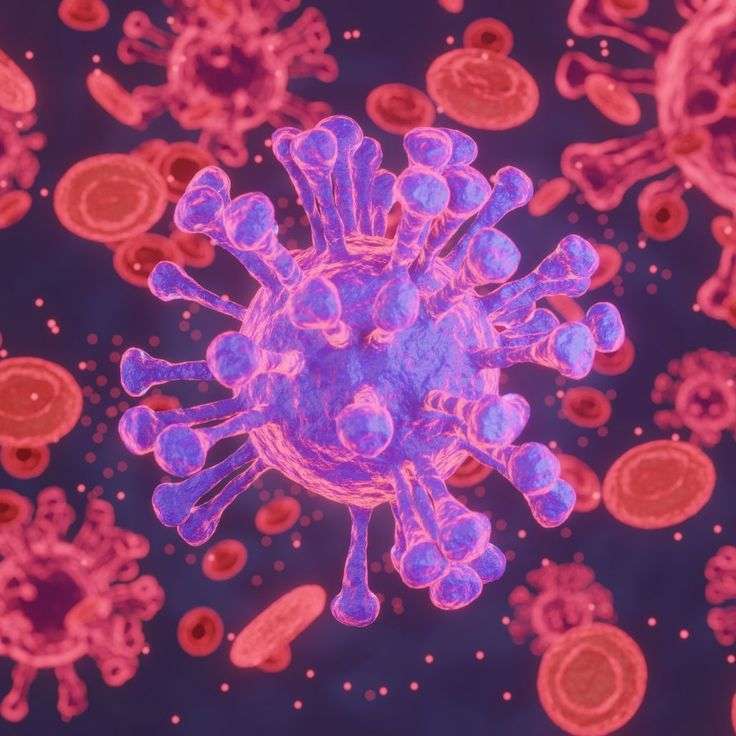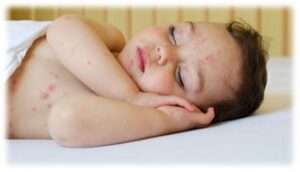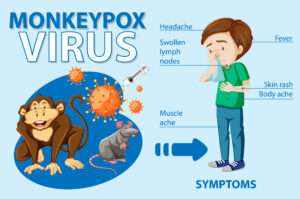Monkeypox in Children
- Dr Owais Rafiq
- September 2, 2024
- 11:25 am

MONKEYPOX IN CHILDREN: RECOGNIZING SYMPTOMS AND ENSURING EFFECTIVE PREVENTION:
Mpox virus is like a smallpox virus but is a rare illness. It was previously called monkeypox virus and comparatively less severe than smallpox. The question now arises here is whether children are more vulnerable to this zoonotic disease. By the word zoonotic we mean that it can easily be spread through physical contact with a person infected by this virus as every parent wants to protect their child from such disease. Let’s get into the details of this virus and ensure your child’s health and safety with us.

-
WHAT IS MPOX VIRUS?
Monkeypox or simply mpox is a viral disease. Usually less severe and contagious than other viral illnesses from the same class. It was first discovered in lab monkeys and has two clades I & II. Mpox can be transmitted to humans through physical contact with someone infectious, with contaminated materials, or with infected animals. The current mpox outbreak in 2024 makes it a global disease. Ensuring every parent takes all the preventive measures to protect their children from this infectious disease.

-
HOW COMMON IS MPOX?
Mpox is a rare illness. But for decades it was mostly seen in Africa and now it has spread to other countries as well like the U.S. and nearby regions. The number of cases has increased in the regions that have not seen such infections before.
-
IS MPOX MORE DEADLY IN CHILDREN?
Anyone can get mpox. Although children are not as much vulnerable to the monkeypox virus as compared to adults, they still can get the virus, and the young child is generally at a higher risk of having worse outcomes in case of getting infected. From some of the reported cases, children below the age of 15 years have been infected with the Mpox virus.
-
SIGNS AND SYMPTOMS?
When infected with this virus, you and your kids may not show symptoms for several days or even a few weeks after exposure. The disease shows symptoms like,
- Fever
- Chills
- Rashes
- Swollen lymph nodes.
- Muscles ache. 
Rashes are rarely fatal however there are various stages of the appearance of rashes like,
- They first develop into flat red bumps that can be painful.
- Then these red bumps turn into blisters filled with pus.
- Eventually the blisters at the end crust over and fall off.
One can get sores into the mouth, hand, feet, penis, and vagina. This process often lasts for two to four weeks.
-
OTHER SYMPTOMS YOU MIGHT EXPERIENCE.
Not everyone gets all the symptoms that are mentioned.
- Some get only a rash (no other symptoms), or other symptoms develop later.
- Flu-like symptoms, then a rash. Some people do not get a rash at all.
- Some people only a have few bumps or blisters or rashes as well.
- Some may have Mpox and not know it. People who are completely healthy and do not have any symptoms of infection, can also transmit it to other people through close contact in an extended period.
-
TRANSMISSION OF
MPOX?
The virus can spread from close contact with infected people or animals.
Kids can become infected if they:
- Have contact with blood, body fluids, or fluids from blisters.
- Use bedding or other items contaminated by the virus.
- Breathe in the virus.
-
WHO WILL GET MORE ILL BY MPOX?
Mpox usually affect people with weaker immune system. Young children, pregnant women or people having skin infections like severe eczema are more prone to this infection.
-
WHEN TO CALL A DOCTOR?
Kids can get rashes for many reasons. So, one should not get doubtful every time. Nevertheless, if any of the members of the family gets a new kind of rash which seems to be like pimples, blisters or other signs of mpox, one should consult a doctor to exclude the causes that might be behind it.
-
PREVENTION FROM MPOX: –
People with mpox usually recover within 2-4 weeks. However, there are certain dos and don’ts parents must ensure to prevent this infection from being spread from kids to others.
| DO’S | DON’TS |
| Stay isolated in your home. | Do not pop blisters and scratch sores. This will lead to slow healing, spread the rash to other parts of your kids’ body, and can cause infection of the skin. |
| Wear a mask and cover lesions when around people. | Do not shave that area until or unless the skin has healed, and new skin comes up. |
| Wash hands with soap and use sanitizers regularly. | |
| Gargle with salt water for mouth sores. | |
| Avoid touching items in shared spaces. | |
| Keep skin dry and uncovered. | |
| Thoroughly cook food. |
- TREATMENT AND VACCINATION: –
The goal of treating mpox in kids is to take care of rashes making sure they will not pop it and make it worse. Manage pain and prevent complications. Early and supportive care is important in helping manage symptoms and avoid further problems.
- CENTRE OF DISEASE CONTROL (CDC) RECOMMENDATION FOR VACCINATION IN CHILDREN: –
| AGE GROUP | NAME OF VACCINATION |
| Children and adolescents <18 years | JYNNEOS via the subcutaneous route |
| Infants <6 months of age | Vaccinia Immune Globulin Intravenous (VIGIV) |
Before giving these vaccines, healthcare professionals should first contact their jurisdictional health department.
Getting a mpox vaccine can help prevent infection. The vaccine should be given within 4 days of contact with someone who has mpox (or within up to 14 days if there are no symptoms).
Vaccines that are developed for smallpox can be used against mpox. But mpox vaccines are only recommended for people who have been exposed to the virus. Contact your healthcare provider immediately to determine if the vaccine is safe for your specific child based on their health and risk factors.
Dr Owais Rafiq
Subscribe to Dr Owais YouTube channel
For parenting advice, child health, symptoms, causes and treatment of illness in children.





